For many amateurs, SEO still hides a number of tricks, and particularly skilled users have to stay up with whatever is happening in the world of online marketing.
- What is SEO?
- Surprising Facts About SEO Most People Don’t Know About
- Duplicate Content Will Not Result in a Penalty.
- Links Are Not Used as a Ranking Factor by All Search Engines.
- Highest Rated Positions Have A Lot More Facebook Interaction.
- Rich Snippets Have No Effect on Your Rankings.
- Only Two Of The Top 10 Leading Websites on the Internet are Content Sites.
- Detection of Objects in Images is an Important Ranking Indicator.
- Google Employs Search Evaluators to Assess the Quality of its Results.
- A Video on Your Homepage Increases Your Chances of Being On Google's First Page.
- Google Uses Travel Time as a Ranking Metric.
- Google Ranks Events According to Popularity.
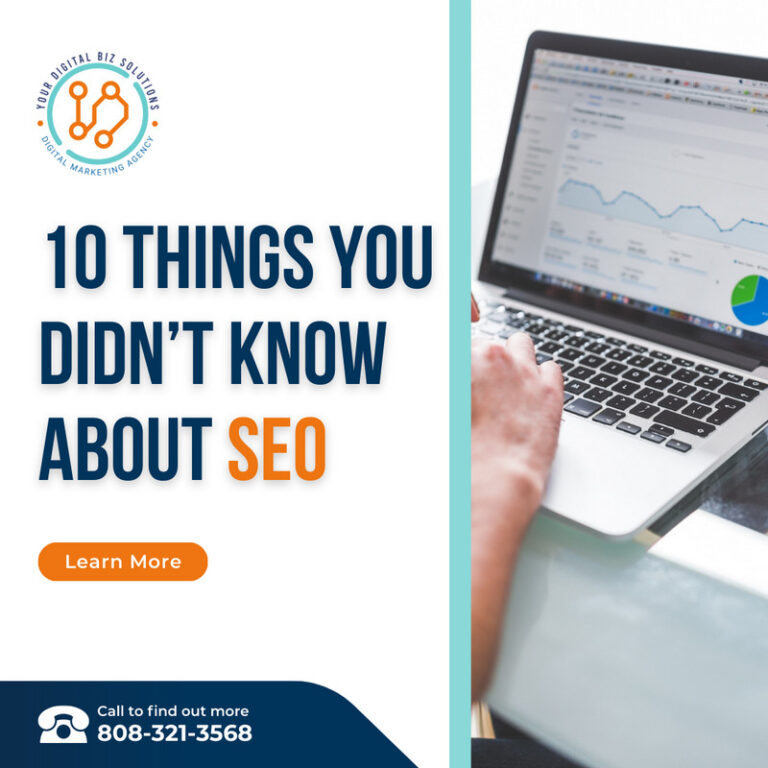
We’ve compiled a list of ten interesting SEO details you probably didn’t know; nevertheless, regardless of whether you know, this comes as a helpful note.
There are numerous SEO facts and statistics available, covering a wide range of topics. All that we’ve attempted to accomplish is compile a collection of shocking facts about SEO that will lead you to reconsider the search engine market. This isn’t a list of its statistics; instead, it’s a collection of the facts that can help you improve your SEO and overall online marketing approach.
In this article, we’ll go over a few aspects of Search Engine Optimization (SEO) that you didn’t seem to know about and how they may help you directly affect the e-commerce business by putting focus on the critical role that it plays in advancing the customer base and its expectations.
What is SEO?
SEO stands for “search engine optimization,” and it refers to the process of increasing website visibility when users use Google, Bing, and other search engines to look for products or services relevant to their businesses.

The higher the pages’ exposure in search results, the more likely it is to grab interest and attract new and existing clients to the business.
To recapitulate, SEO is the cornerstone of a well-rounded marketing strategy. Once you know what your website visitors seek, you can then use that knowledge for your organic and paid advertising, your website, and your social media assets, among other things.
Surprising Facts About SEO Most People Don’t Know About
1. Duplicate Content Will Not Result in a Penalty.
Google views copied content differently from duplicate content. Duplicate content will not result in a penalty, whereas copied content will.
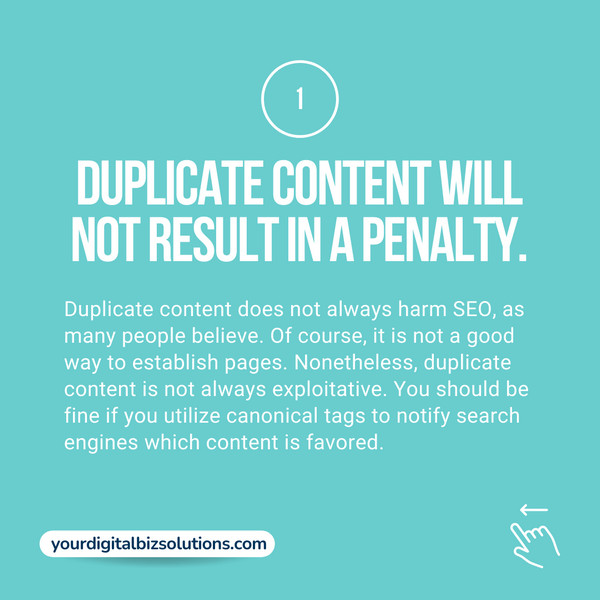
Duplicate content does not always harm SEO, as many people believe. Of course, it is not a good way to establish pages. Nonetheless, duplicate content is not always exploitative. You should be fine if you utilize canonical tags to notify search engines which content is favored.
What we want to emphasize is that many users have never looked into what Google says regarding duplicate content. Here are some key points you need to know:
- Google does not issue a duplicate penalty.
- But it does reward unique content by associating it with increased value.
- The duplicate content is discarded.
- Google is looking for new content, and duplicates cause the search engine to slow down.
- If you do want Google to find your new material quickly, provide XML sitemaps
- Google encourages us to focus on indications in authoritative documents and optimize those canonical pages so that they are more user-friendly.
- When we consider SEI, it is not duplicate content but a lack of original content that is harming our rating.
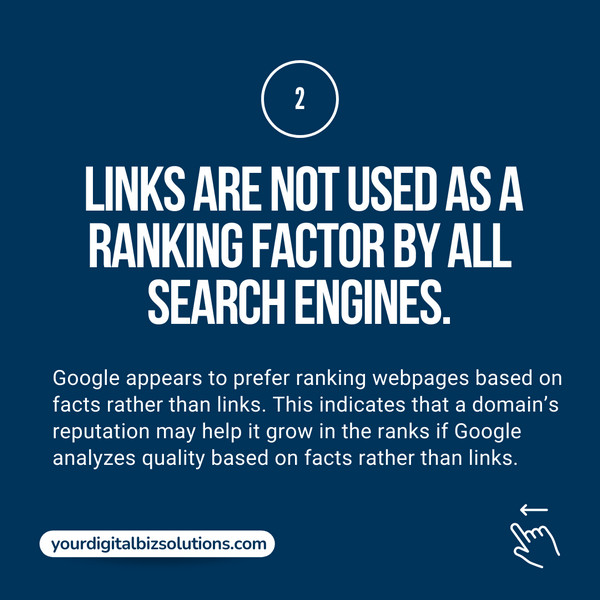
2. Links Are Not Used as a Ranking Factor by All Search Engines.
Is it feasible to rank if you don’t have any links? The answer is yes.
In Russia, the leading search engine, Yandex, no longer considers links to be a ranking factor. So, possibly, Google may be going down the same path.
Russian advertising SERPs (Search Engine Results Pages) in Yandex and Google are among the most trafficked, with suspicious SEO strategies being employed to swiftly rank unscrupulous sites. Given the circumstances, Yandex stated that its algorithm would then be “link-free.”
Would other search engines soon follow? Will Google’s algorithm be updated to delete links? Google appears to prefer ranking webpages based on facts rather than links. This indicates that a domain’s reputation may help it grow in the ranks if Google analyzes quality based on facts rather than links.
Are social signals considered a ranking factor? The answer is not as straightforward as “yes” or “no.”
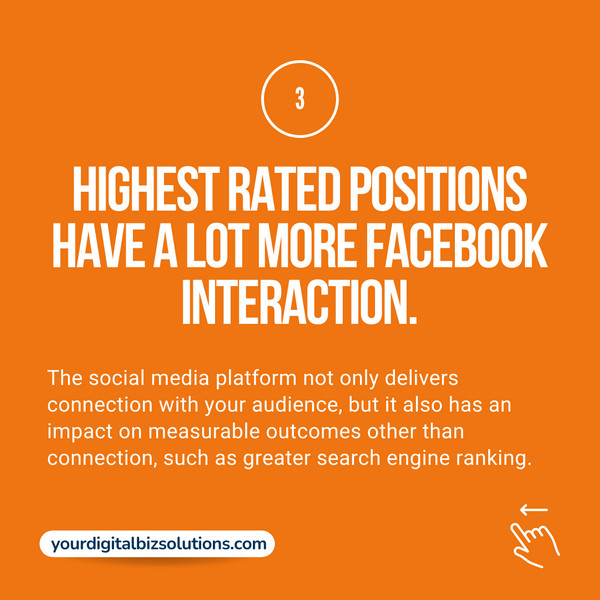
There is a sense of ambiguity and intrigue about the impact of shares, comments, likes, and other social media interactions have on SEO generally.
Between Google+ (which is deplored), Pinterest, or LinkedIn, it appears that relatively high rankings are associated with high shares on Facebook, LinkedIn, and Pinterest combined. However, the strongest correlation was between a high percentage of Facebook shares and superior ranks.
True, correlation does not imply causation, but such a strong correlation cannot be disregarded. It appears that Facebook interactions have an impact on Google search rankings. As a result, the social media platform not only delivers connection with your audience, but it also has an impact on measurable outcomes other than connection, such as greater search engine ranking.
You do not even have to become an SEO professional to understand that genuine listings are difficult to come by, regardless of the SEO strategies or social media marketing you’ve employed. However, any assistance that improves your search traffic is sincerely valued.
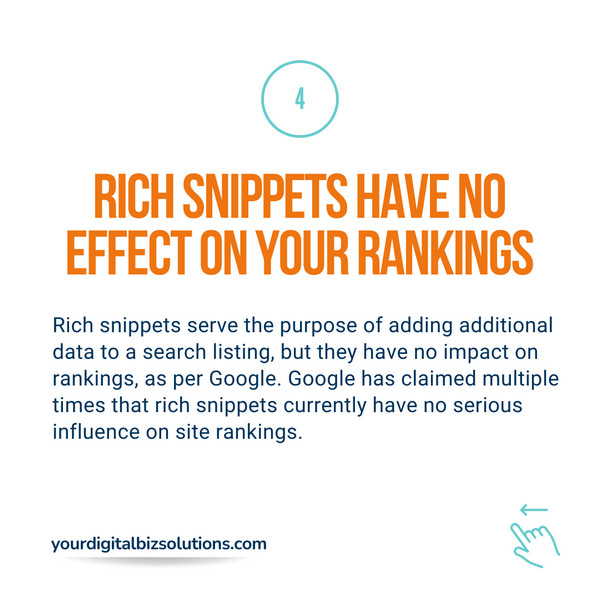
4. Rich Snippets Have No Effect on Your Rankings.
Since their debut in 2009, rich snippets have served as a sneak preview on the SERP page. Could it be true that they have a direct effect on your ranks? No, not at all.
Rich snippets serve the purpose of adding additional data to a search listing, but they have no impact on rankings, as per Google. Google has claimed multiple times that rich snippets currently have no serious influence on site rankings.
This is not to say that it cannot provide indirect SEO benefits, such as making a website more easily expose or display useful information to the reader. Rich snippets will indirectly assist you in getting many more users to explore your site, which might also aid you a little bit with your rankings. Nevertheless, rich snippets have no significant impact on your rankings.
5. Only Two Of The Top 10 Leading Websites on the Internet are Content Sites.
To fully grasp this, let’s look at the top ten most visited sites according to Ebizma. Google, Facebook, YouTube, and Yahoo! tend to be the most popular websites in September 2019. Amazon, Wikipedia, Twitter, Bing, eBay, and MSN are just a few examples.
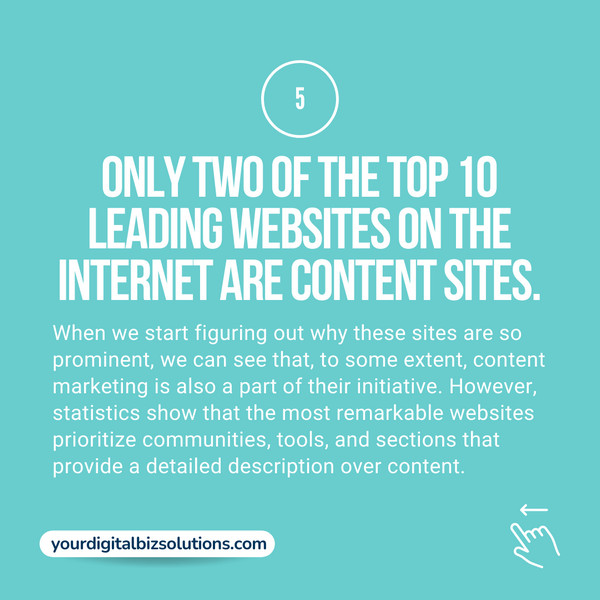
However, if we think about it for a second, we can see that only Wikipedia and YouTube are actually content-oriented websites. The others, if we can call them that, are “content gateways,” but they do not provide direct material in the same way that a conventional site does.
This leads us to an important question: Is usefulness more important than content?
Eight of those sites provide essential consumers with something to do other than consume. They don’t really end at passively reading or video streaming, but rather they provide people with tools and places where they could do something. These websites are renowned because the fundamental user’s action does not end with content consumption.
Google is a service that allows people to swiftly search the entire web for what they are looking for. They are popular not because of great content or wonderful link bait, but because of engagement.
We do not want to imply that content marketing is ineffective. Quality content is fantastic since it provides an incredible opportunity for growth. What we are emphasizing is that interaction appears to be doing miracles.
When we start figuring out why these sites are so prominent, we can see that, to some extent, content marketing is also a part of their initiative. However, statistics show that the most remarkable websites prioritize communities, tools, and sections that provide a detailed description over content.
Furthermore, the two most popular content sites, YouTube and Wikipedia, continue to make use of user-generated content.

6. Detection of Objects in Images is an Important Ranking Indicator.
You may be aware that Google is capable of recognizing items in images, but you may be unaware that the recognition system is now a ranking indicator that can influence any business.
It is true that there has been extensive research on image recognition using systems of equations and algorithms since the nineties, so we can claim that the subject has piqued the interest of researchers ever since the advent of search engines. Then the concept of picture optimization will appeal to users rather than the traditional method of inserting header tags and substituting content.
This function enables search engines to recognize the information included inside the images you submit on your websites and rank them accordingly. Through picture sentiment analysis, you may add information to your image database, regulate offensive content, and allow new marketing possibilities.
7. Google Employs Search Evaluators to Assess the Quality of its Results.
As you may be aware, Google uses a variety of algorithms to rank webpages. You might be astonished to learn that Google recruited employees who perform approximately 40,000 precise evaluations to assess the effectiveness of search results.
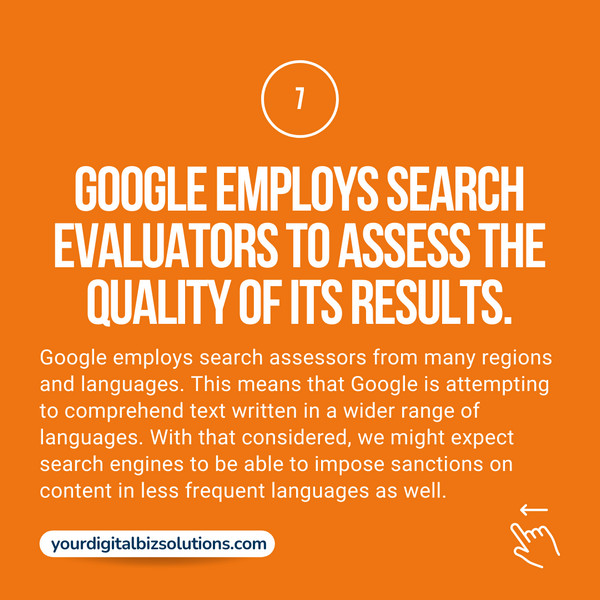
These search evaluators are responsible for determining the quality of the results for various queries.
Google employs search assessors from many regions and languages. This means that Google is attempting to comprehend text written in a wider range of languages.
With that considered, we might expect search engines to be able to impose sanctions on content in less frequent languages as well. According to Google, the Penguin algorithm currently affects around 3.1 percent of English-language search queries and approximately 3 percent of queries in languages such as German, Chinese, and Arabic. These skilled specialists may be able to detect spam in more languages, affecting overall rankings.
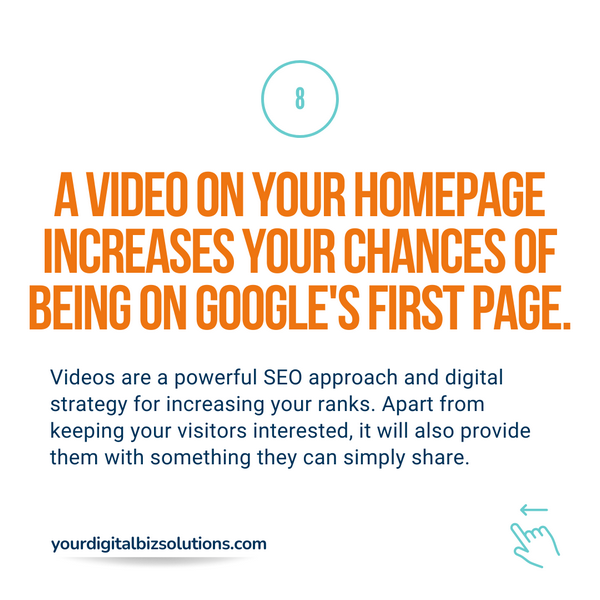
8. A Video on Your Homepage Increases Your Chances of Being On Google's First Page.
All of YouTube’s accomplishments in recent years have elevated it to the world’s second most popular search engine, as well as the preferred digital platform for video advertising and marketing.
For several people, videos are instantly more appealing than text, and Google holds YouTube in a special place. We should also keep in mind that it is, after all, owned by Google.
According to Aimclear’s research, the platform we use to post our videos appears to have an impact on our capacity to rank. Unsurprisingly, Youtube turned out to be the recommended platform. Although YouTube dominates Google’s SERP, other platforms have had some significance as well.
Furthermore, according to the same Aimclear study described above, almost all of the videos returned in global SERPs were likewise ranked on the first page on their original platform. A high position on YouTube results does not indeed ensure worldwide search placement, but it appears to be a must.
In addition, whether direct or indirect, videos are a powerful SEO approach and digital strategy for increasing your ranks. Apart from keeping your visitors interested, it will also provide them with something they can simply share.
9. Google Uses Travel Time as a Ranking Metric.
Travel time is the actual time taken for someone to get from one area to another in order to attend to an event, place, or business that he or she is engaged in, and as a result, it is relevant to local search and local SEO.
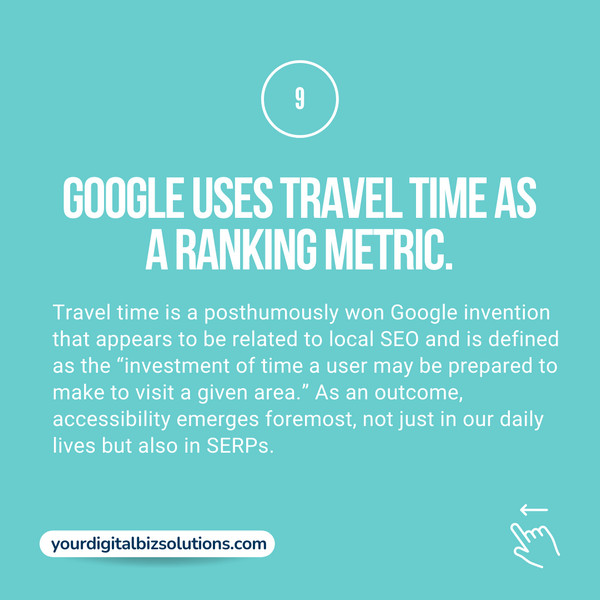
Travel time is a posthumously won Google invention that appears to be related to local SEO and is defined as the “investment of time a user may be prepared to make to visit a given area.” As an outcome, accessibility emerges foremost, not just in our daily lives but also in SERPs.
Additionally, Google appears to be interested in knowing if a person visits a location after seeing it on Google Maps, either by implementing a suggestion or by seeing it in the search results. As Bill Slawski pointed out, the term “time investment” in this Google patent relates to the amount of time it takes to visit a location that appeared in the search results.
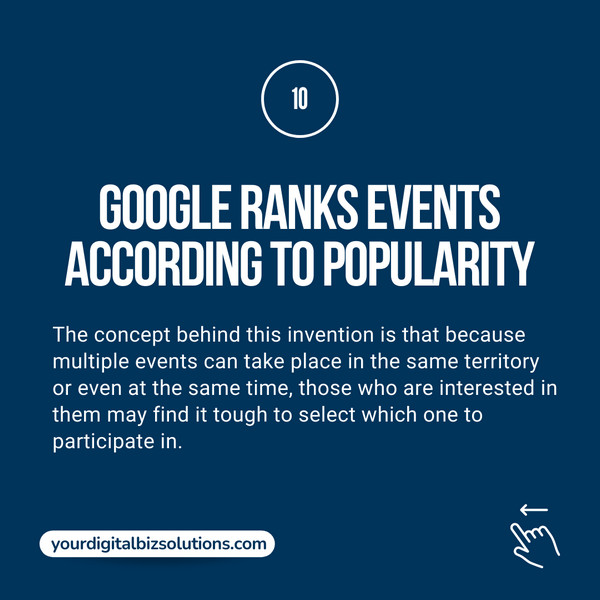
10. Google Ranks Events According to Popularity.
As per another Google trademark, it appears that the search engine would eventually rank events based on engagement rather than the quantity of link building pointing to the event’s webpages.
The concept behind this invention is that because multiple events can take place in the same territory or even at the same time, those who are interested in them may find it tough to select which one to participate in.
Google will receive data regarding events that occurred throughout a specific time period, as well as generate signal ratings for those activities. According to the claim, other indicators for ranking events include:
- creating a preliminary event rating predicated on engagement values
- calculating an updated reputation score based on the original rating for each of the events
- constructing a ranking of events that occur in a geographical region by ranking the events based on updated popularity levels
Conclusion
We’ve disclosed some statistics from the search engine optimization (SEO) sector that we hope will assist you with the local searches and entire digital marketing strategy above. The search engine industry is a constantly changing platform where smart SEO still pays better and draws traffic.
Even if you invest in paid search or link development, what we ultimately want is for all internet users to generate genuine hits on our website.
Our common goal is to increase sales. And, given that 93 percent of online encounters originate with a search engine, knowing the Google SEO data that can affect your webpage’s success (whether they are SEO facts from 2017 or earlier SEO data from 2016) is essential.
There is no best and most effective SEO stat, guideline, or fact, a leading generation methodology, or a lead generating strategy that will ensure marketing success.
However, the SEO facts we’ve discussed throughout this article may be useful to you in your page and off page SEO, integrated marketing, or content initiatives.
Conversion rates do not come easily, and a few pieces of SEO advice, sponsored ads, or marketing statistics will not bring in a million monthly active users overnight.
However, being aware of SEO statistics and facts and tailoring your digital marketing to them will undoubtedly increase your world wide web visibility. Keep up with marketing trends, be engaged with content production, monitor where your users visit, and invest in inbound marketing so that organic results will definitely turn up.

Bea Manzano
Bea have always been passionate about writing even at a young age. What started out as a hobby soon became her career. She has written blogs and articles for different industries such as Real Estate, Lumber Companies, Home Decors, Cat Hotels, Travel Industry, and many more. When she's not writing, you can find her either at home watching her favorite TV series while sipping milk tea or outdoors going on roadtrips with her family.






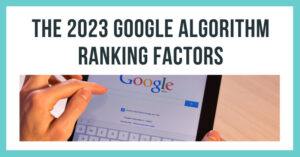







3. Highest Rated Positions Have A Lot More Facebook Interaction.